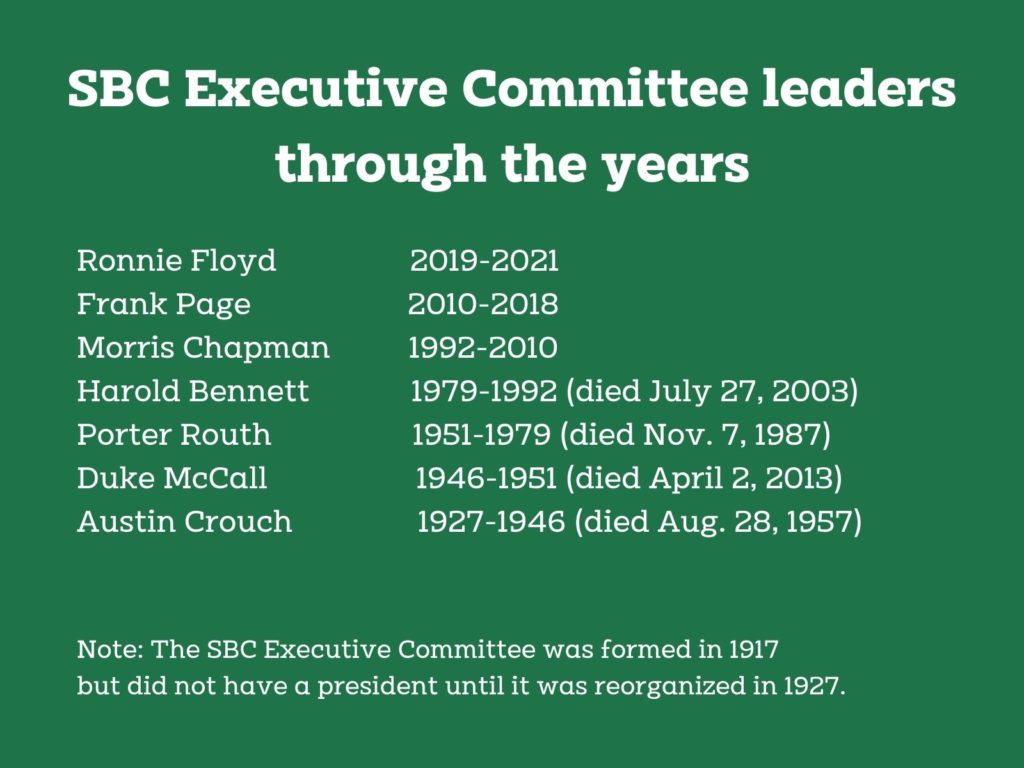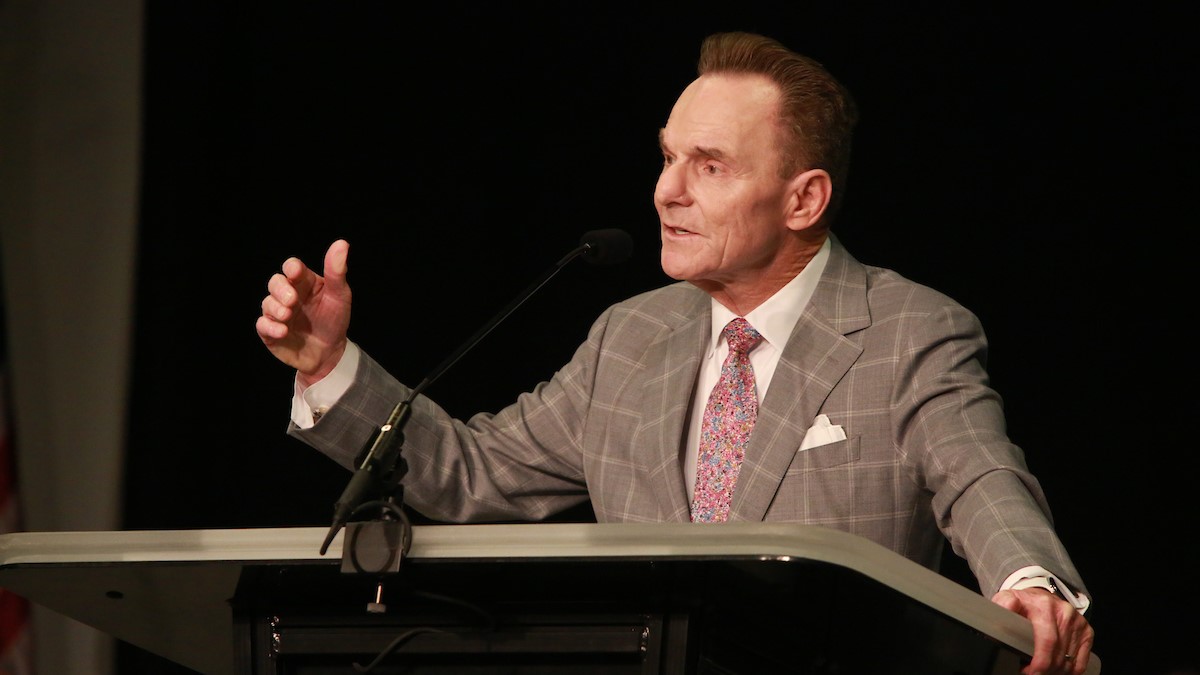After 28 months at the helm of the Southern Baptist Convention Executive Committee, Ronnie Floyd will conclude his tenure Oct. 31. The announcement came in an Oct. 14 emailed letter addressed to EC trustees and the SBC family.
“Due to my personal integrity and the leadership responsibility entrusted to me, I will not and cannot any longer fulfill the duties placed upon me as the leader of the executive, fiscal, and fiduciary entity of the SBC,” Floyd said. “In the midst of deep disappointment and discouragement, we have to make this decision by our own choice and do so willingly, because there is no other decision for me to make.”
Floyd’s decision comes amid a variety of controversial issues swirling in the denomination as well as conflict regarding its handling of sexual abuse cases in the past.
Motion approved in June
Even as messengers to the June 2021 SBC Annual Meeting in Nashville adopted Floyd’s Vision 2025 to reach the world with the gospel, messengers also overwhelmingly approved a motion calling for action related to questions surrounding previous sexual abuse cases in SBC life.
The motion called for a task force to be appointed to oversee a third-party investigation into the allegations of mishandling abuse claims and mistreating abuse victims by the EC between Jan. 1, 2000, and June 14, 2021. SBC President Ed Litton appointed the Sexual Abuse Task Force, chaired by North Carolina pastor Bruce Frank, in July.
A key component of the motion specifically called for EC staff and trustees to waive attorney-client privilege during the investigation, but waiving attorney-client privilege quickly became a heated debate. A majority of EC members opposed it initially — some expressing a need for more time to understand the ramifications and others fearful of bankrupting the SBC.
A solid one-fourth of EC representatives came into the first meeting Sept. 20–21 insisting on waiving privilege to follow as closely as possible the directive of the motion’s wording, but the vote to move ahead failed 55 to 20.
Floyd urged trustees to find a path that achieved a credible and thorough investigation without waiving privilege.
“The SBC Executive Committee is committed to doing the right thing in the right way in order to elevate the mission of the Convention — eliciting, combining, and directing our energies for the global propagation of the gospel,” he shared during the Sept. 20–21 meeting.
“The SBC Executive Committee stands against all forms of sex abuse, mishandling of abuse, mistreatment of victims and any intimidation of abuse survivors in every Southern Baptist church, association, state convention, entity and affiliated organization.
“As president and CEO of the SBC Executive Committee, I encourage the members of the SBC Executive Committee to work with the Sex Abuse Task Force and the independent review firm in every way possible, but within our fiduciary responsibilities as assigned by the messengers.”
Intense discussions
Because the EC members could not agree on an option during the first September meeting, they agreed to meet again on Sept. 28 to hammer out a plan but found themselves in a stalemate a second time. The vote to waive privilege only failed by four votes this time (39 to 35), however. After more than five hours in the virtual meeting, the group voted to take another week for negotiations and returned Oct. 5 for a second virtual meeting. It was in that meeting, the vote to waive privilege passed in a 44–31 vote.
As EC members wrestled with their decision, social media platforms carried hundreds of messages from pastors, state convention leaders, the six SBC seminary presidents and other leaders. The flood of messages uniformly criticized EC members’ reluctance to waive privilege and urged them to follow the messengers’ directive.
Amid the social media firestorm, some Southern Baptists continued to hail Floyd as a man of integrity who could lead the denomination forward while others pointedly called on him to resign.
Comments also surfaced repeatedly from within the EC board about how some members would have to resign if privilege was waived and six did resign following the Sept. 28 meeting.
Two members resigned after the Oct. 5 vote and two more the following week, leaving 75 of the 86 Executive Committee seats filled (one seat had been vacated prior to the September meetings).
Law firm pulls out
On Oct. 11, the law firm of Guenther, Jordan & Price, which had served as general counsel to the EC and the overall SBC for close to six decades, also resigned, citing that the EC’s vote “fundamentally changed the understanding that has always existed regarding communications between our firm and the Executive Committee or the Convention.”
Floyd agreed with the concern over waiving privilege.
“Our SBC Executive Committee has had an unwavering commitment to doing this needed review. Our commitment has always been to fulfill the desires of the messengers, but the deliberations were about ‘how to do this’ in the most effective way,” he said in his resignation letter. “There was a way it could have been done that fulfilled these desires without creating these potential risks relating to the Convention’s liability.”
Moving forward
While sharing his hurt and disappointment over how the past few weeks have played out, Floyd also committed to “ensure our team is ready to complete the matters that will accomplish the will of this Convention” as he concludes his service.
EC Chairman Rolland Slade also will be helping lead the EC through this next season and will work with the trustees to appoint a seven-member search committee for a new president, vowing not “to rush into anything.”
Floyd came in as ‘trusted voice’
 Elected on April 2, 2019, as the EC’s seventh chief executive, Floyd received 68 of 69 votes cast by EC trustees and was widely hailed as a visionary leader who would build unity among Southern Baptists.
Elected on April 2, 2019, as the EC’s seventh chief executive, Floyd received 68 of 69 votes cast by EC trustees and was widely hailed as a visionary leader who would build unity among Southern Baptists.
“Ronnie Floyd is a trusted voice of experienced leadership,” said then-EC chairman Mike Stone, an ex officio member of the search committee that recommended Floyd.
International Mission Board President Paul Chitwood stated at the time of Floyd’s election, “Dr. Floyd is a visionary Great Commission leader and passionate prayer warrior who loves the local church, works to build unity in our Convention, and models and promotes racial reconciliation. God has answered our prayers for the search committee.”
North American Mission Board President Kevin Ezell agreed, “Ronnie Floyd is a visionary leader who is wholly devoted to advancing God’s Kingdom. His heart for prayer and spiritual awakening will help keep Southern Baptists focused on reaching our world for Christ. I believe Ronnie is just what we need as we walk through times that are challenging yet filled with opportunity.”
Prior to serving the EC, Floyd was senior pastor of Cross Church in northwest Arkansas for 33 years. During his tenure, the multisite congregation planted close to 150 churches, baptized more than 22,000 people and gave more than $11.5 million to the Cooperative Program. He also served as pastor of four First Baptist churches in Texas — Cherokee, Milford, Palacios and Nederland (1976–1986).
His other denominational roles have included: EC chairman (1995–1997), Great Commission Task Force chairman (2009–2010) and SBC president (2014–2016).
Read the full letter from Floyd at this link.








